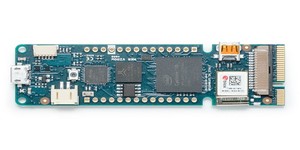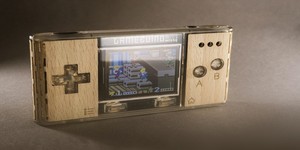Intel is officially stepping up its assault on the maker market, teaming up with Arduino to release a Curie-powered alternative to microcontroller development boards: the Genuino 101.
To be known as the Arduino 101 in the US and the Genuino 101 elsewhere, thanks to an ongoing trademark dispute, the board marks the first Curie-based product to be aimed at end-users rather than corporate product engineering departments. First announced back in January, the original Curie module was a tiny, wearable-focused device based around the latest low-power Quark SE 32-bit Pentium microprocessor. While the ultra-small form factor made the Curie easy to embed in professional projects, it wasn't exactly accessible to the hobbyist - and that's where the Genuino 101 comes in.
Built on the classic Arduino microcontroller layout, the Genuino 101 ditches the usual Atmel microcontroller unit for the Curie module. As well as giving Intel a foot in the door to the microcontroller market, the Curie boosts the capabilities of the Genuino 101 above and beyond traditional Arduino boards: the Quark SE gives it more processing power and memory, while the Curie module itself includes integrated accelerometer and gyroscope sensors as well as low-power Bluetooth Smart connectivity.
The Genuino 101 is a true partnershp between the two companies, too, and not just a semi-compatible Arduino-alike. '“We worked closely with Intel on the development of this board and are expanding our educational courseware to incorporate the connectivity and advanced features expected by today’s student developers,' explained Massimo Banzi, co-founder and chief executive at Arduino, of the Genuino 101. “Through our work with Intel, we’re able to reach a global community of entry-level makers and students with a comprehensive introduction to physical computing and now with a more advanced, powerful technology solution that will help them bring their creative visions to reality.[/i]'
The Genuino 101 is due to launch in early 2016, and will be priced at around $30 - a small premium over the popular Atmel ATmega-powered Arduino Uno, and roughly on-par with the Raspberry Pi Model B+ microcomputer.
To be known as the Arduino 101 in the US and the Genuino 101 elsewhere, thanks to an ongoing trademark dispute, the board marks the first Curie-based product to be aimed at end-users rather than corporate product engineering departments. First announced back in January, the original Curie module was a tiny, wearable-focused device based around the latest low-power Quark SE 32-bit Pentium microprocessor. While the ultra-small form factor made the Curie easy to embed in professional projects, it wasn't exactly accessible to the hobbyist - and that's where the Genuino 101 comes in.
Built on the classic Arduino microcontroller layout, the Genuino 101 ditches the usual Atmel microcontroller unit for the Curie module. As well as giving Intel a foot in the door to the microcontroller market, the Curie boosts the capabilities of the Genuino 101 above and beyond traditional Arduino boards: the Quark SE gives it more processing power and memory, while the Curie module itself includes integrated accelerometer and gyroscope sensors as well as low-power Bluetooth Smart connectivity.
The Genuino 101 is a true partnershp between the two companies, too, and not just a semi-compatible Arduino-alike. '“We worked closely with Intel on the development of this board and are expanding our educational courseware to incorporate the connectivity and advanced features expected by today’s student developers,' explained Massimo Banzi, co-founder and chief executive at Arduino, of the Genuino 101. “Through our work with Intel, we’re able to reach a global community of entry-level makers and students with a comprehensive introduction to physical computing and now with a more advanced, powerful technology solution that will help them bring their creative visions to reality.[/i]'
The Genuino 101 is due to launch in early 2016, and will be priced at around $30 - a small premium over the popular Atmel ATmega-powered Arduino Uno, and roughly on-par with the Raspberry Pi Model B+ microcomputer.

MSI MPG Velox 100R Chassis Review
October 14 2021 | 15:04









Want to comment? Please log in.